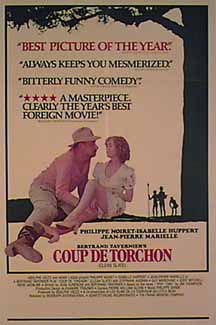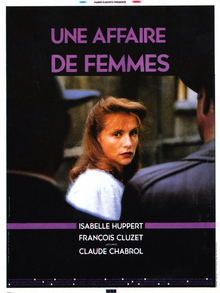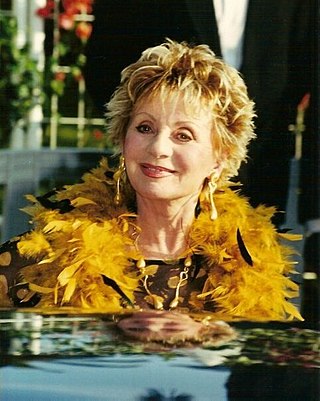
Claude Henri Jean Chabrol was a French film director and a member of the French New Wave group of filmmakers who first came to prominence at the end of the 1950s. Like his colleagues and contemporaries Jean-Luc Godard, François Truffaut, Éric Rohmer and Jacques Rivette, Chabrol was a critic for the influential film magazine Cahiers du cinéma before beginning his career as a film maker.

Isabelle Anne Madeleine Huppert is a French actress. Known for her portrayals of cold, austere women devoid of morality, she is considered one of the greatest actresses of her generation. With 16 nominations and two wins, Huppert is the most nominated actress at the César Awards. She is also the recipient of several accolades, including five Lumières Awards, a BAFTA Award, three European Film Awards, two Berlin International Film Festival, three Cannes Film Festival and Venice Film Festival honors, a Golden Globe Award, and an Academy Award nomination. In 2020, The New York Times ranked her second on its list of the greatest actors of the 21st century.

Jacques Dutronc is a French singer, songwriter, guitarist, composer, and actor. Some of Dutronc's best-known hits include "Il est cinq heures, Paris s'éveille", "Le Responsable", and "Les Cactus".

Coup de Torchon is a 1981 French crime film directed by Bertrand Tavernier and adapted from Jim Thompson's 1964 novel Pop. 1280. The film changes the novel's setting from an American Southern town to a small town in French West Africa. The film had 2,199,309 admissions in France and was the 16th most attended film of the year. It received the Prix Méliès from the French Syndicate of Cinema Critics as the best French film of 1981.

Chocolat is a 2000 romance film, based on the 1999 novel Chocolat by the English author Joanne Harris, directed by Lasse Hallström. Adapted by screenwriter Robert Nelson Jacobs, Chocolat tells the story of Vianne Rocher, played by Juliette Binoche, who arrives in the fictional French village of Lansquenet-sous-Tannes at the beginning of Lent with her six-year-old daughter, Anouk. She opens a small chocolaterie. Soon, she and her chocolate influence the lives of the townspeople of this repressed French community in different and interesting ways.

Sandrine Bonnaire is a French actress, film director and screenwriter who has appeared in more than 40 films. She won the César Award for Most Promising Actress for À Nos Amours (1983), the César Award for Best Actress for Vagabond (1985) and the Volpi Cup for Best Actress for La Cérémonie (1995). Her other films include Under the Sun of Satan (1987), Monsieur Hire (1989), East/West (1999) and The Final Lesson (2015).

Anna Mouglalis is a French actress and model. She is known for being a house ambassador for Chanel since 2002, and for portraying the fashion designer Coco Chanel in the 2009 film Coco Chanel & Igor Stravinsky, and actress Paula Maxa in the 2018 film The Most Assassinated Woman in the World.

Benoît Magimel is a French actor. He was 14 when he appeared in his first film, and has starred in a variety of roles in French cinema. At age 16, Magimel left school to pursue acting as a career. In 2001, he won the Best Actor award at the Cannes Film Festival for his role in Michael Haneke's The Piano Teacher. He also starred in Claude Chabrol's La Demoiselle d'honneur.
The 7th San Diego Film Critics Society Awards, given by the San Diego Film Critics Society on 20 December 2002, honored the best in film for 2002.

La Cérémonie is a 1995 French-German psychological thriller film by Claude Chabrol, adapted from the 1977 novel A Judgement in Stone by Ruth Rendell. The film echoes the case of Christine and Lea Papin, two French maids who brutally murdered their employer's wife and daughter in 1933, as well as the 1947 play they inspired, The Maids by Jean Genet.

Story of Women is a 1988 French drama film directed by Claude Chabrol, based on the true story of Marie-Louise Giraud, guillotined on 30 July 1943 for having performed 27 abortions in the Cherbourg area, and the 1986 book Une affaire de femmes by Francis Szpiner.
The 14th César Awards ceremony, presented by the Académie des Arts et Techniques du Cinéma, honoured the best French films of 1988 and took place on 4 March 1989 at the Théâtre de l'Empire in Paris. The ceremony was chaired by Peter Ustinov and hosted by Pierre Tchernia. Camille Claudel won the award for Best Film.
The 17th César Awards ceremony, presented by the Académie des Arts et Techniques du Cinéma, honoured the best French films of 1991 and took place on 22 February 1992 at the Palais des Congrès in Paris. The ceremony was chaired by Michèle Morgan and hosted by Frédéric Mitterrand. Tous les matins du monde won the award for Best Film.

Léonie Juliana, Baroness Cooreman, also known by her stage name Annie Cordy, was a Belgian actress and singer. She appeared in more than 50 films from 1954 and staged many memorable appearances at Bruno Coquatrix' famous Paris Olympia. Her version of "La Ballade de Davy Crockett" was number 1 in the charts for five weeks in France in August 1956. She was born in Laeken, Belgium, where in 2004, King Albert II of Belgium bestowed upon her the title of Baroness in recognition for her life's achievements.

Elle is a 2016 psychological thriller film directed by Paul Verhoeven from a screenplay by David Birke, based on the 2012 novel Oh... by Philippe Djian. The film stars Isabelle Huppert as a businesswoman who is raped in her home by a masked assailant.

Pierre-André Boutang was a French documentary filmmaker, producer and director. He was one of the leaders of the Franco-German channel Arte as well as of La Sept previously.

The Chocolate Cobweb is a 1948 mystery thriller novel by the American writer Charlotte Armstrong. It was first published in New York by Coward-McCann, an imprint of Putnam. Its first British publication came four years later in 1952. A French-language film adaptation of the novel, Merci pour le Chocolat, was released in 2000.














